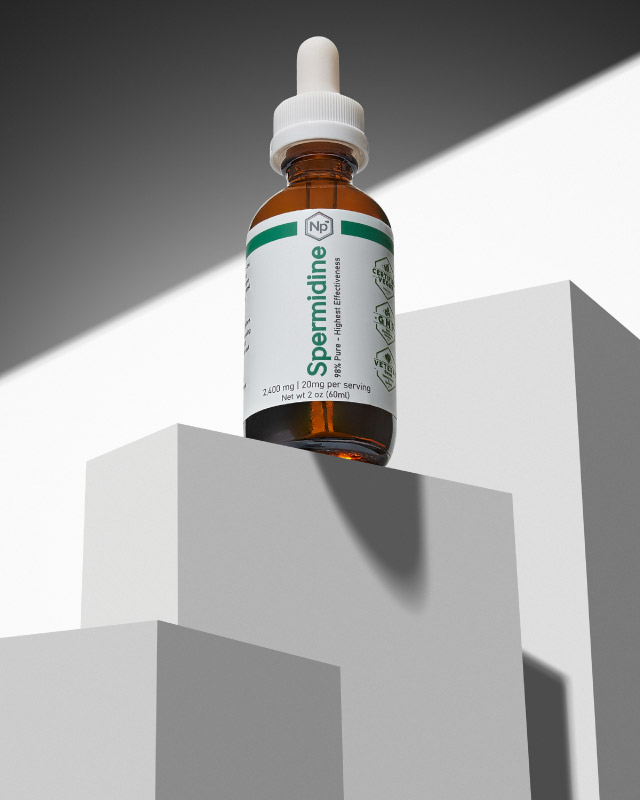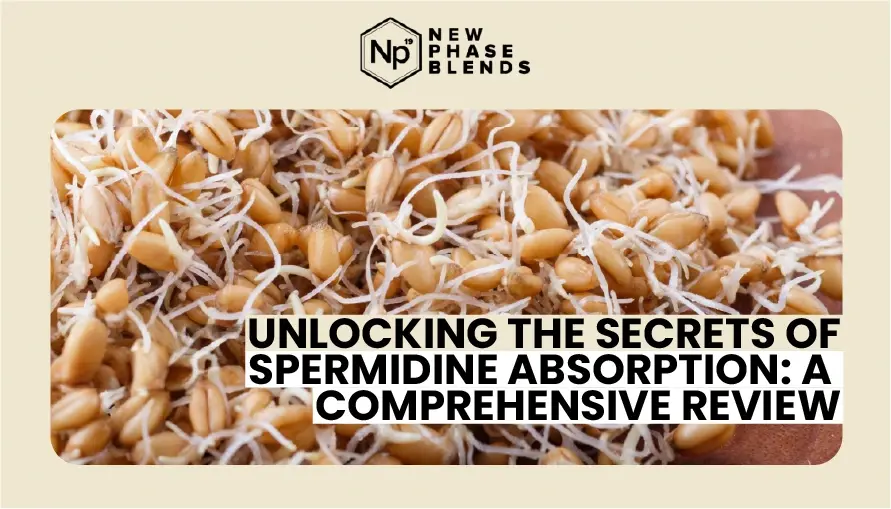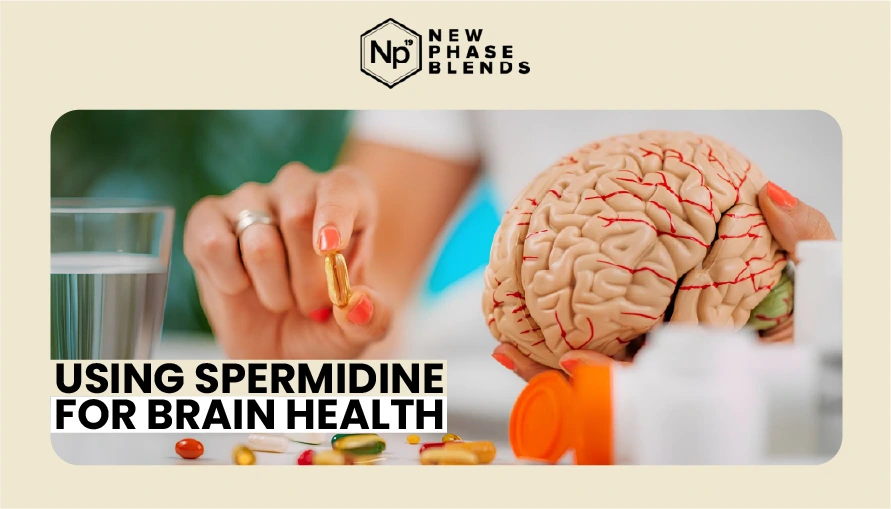Are you considering adding spermidine supplements to your wellness routine but concerned about potential negative effects? You’re not alone. As spermidine gains popularity for its purported anti-aging and health benefits, many people are left wondering about spermidine side effects and overall safety. This comprehensive guide addresses these concerns with evidence-based information to help you make an informed decision.
Editor’s note: We’ve noticed that while many online sources highlight the benefits, fewer resources adequately address potential side effects of spermidine use. This article fills that gap by examining both the research-backed benefits and possible drawbacks of spermidine supplementation.
What Is Spermidine and Why Do People Take It?
Spermidine is a naturally occurring polyamine compound found in various foods and produced in small amounts by the human body. Named after its original discovery in semen, this compound is now recognized for its presence in foods like wheat germ, mushrooms, aged cheese, and legumes.

People primarily take spermidine supplements for their potential to support cellular autophagy (the body’s natural “cleaning” process), promote longevity and healthy aging, and support cardiovascular health.
While these benefits have sparked significant interest in spermidine supplementation, understanding potential side effects is equally important before beginning any new supplement regimen.
Common Spermidine Side Effects: What Research Shows
Research on spermidine supplementation is still evolving, with most human studies being relatively small and short-term. Current evidence suggests that spermidine is generally well-tolerated at recommended doses, but some side effects have been reported.
Digestive Discomfort
The most commonly reported side effect of spermidine supplements is mild digestive discomfort, which may include stomach upset or nausea and occasional bloating (Schwarz et al., 2018). A randomized controlled trial by Kiechl et al. (2018) reported that approximately 7% of participants experienced mild gastrointestinal symptoms during the first few weeks of supplementation.
These effects appear to be dose-dependent and typically occur when starting supplementation or taking higher doses. Eisenberg et al. (2016) observed that digestive side effects were more prevalent at doses exceeding 5mg per day compared to lower doses. Many people report that these symptoms subside as their body adjusts to the supplement, consistent with findings by Wirth et al. (2019) in their 3-month intervention study.
Potential Interactions with Medications
Spermidine affects various cellular processes, which raises concerns about possible interactions with certain medications. While research in this area is limited, theoretical concerns exist regarding immunosuppressant medications, as spermidine may influence immune function (Madeo et al., 2018), and anticoagulants, since spermidine might affect platelet function (Park & Igarashi, 2013).
A preclinical study by Puleston et al. (2019) suggested potential interactions between spermidine’s autophagy-enhancing effects and immunomodulatory therapies, indicating the need for caution when combining these agents. It’s essential to consult with a healthcare provider before taking spermidine supplements if you’re on any prescription medications.
Allergic Reactions
Though rare, allergic reactions to spermidine supplements have been reported. These may manifest as skin rashes or hives, swelling (particularly of the face, tongue, or throat), and difficulty breathing. Case reports documented by Minois (2014) identified hypersensitivity reactions in a small percentage of individuals, particularly those with pre-existing allergies to polyamine-rich foods.
If you experience any signs of an allergic reaction, discontinue use immediately and seek medical attention. A surveillance study by Schwarz et al. (2020) emphasized the importance of prompt discontinuation to prevent progression to more severe allergic responses.
Is Spermidine Safe?
One of the most significant concerns regarding spermidine supplementation is the limited data on long-term safety. Most human studies have been relatively short in duration, typically lasting from a few weeks to several months.
Animal studies have shown promising safety profiles with longer-term use, but human data remains limited. This gap in research is particularly relevant given that many potential benefits of spermidine, such as longevity and anti-aging effects, would theoretically require extended supplementation.
Who Should Exercise Extra Caution When Using Spermidine?
Pregnant and Breastfeeding Women
Due to insufficient safety data, pregnant and breastfeeding women should avoid spermidine supplements unless specifically recommended by their healthcare provider. Naturally occurring dietary spermidine from food sources is generally considered safe during pregnancy and lactation.
People with Liver or Kidney Conditions
Since these organs are involved in metabolizing and eliminating supplements from the body, individuals with liver or kidney impairment should consult with a healthcare provider before taking spermidine supplements.
Cancer Patients
The relationship between spermidine and cancer is complex. While some research suggests that spermidine may have cancer-protective effects through its role in autophagy, other studies have raised theoretical concerns about its potential to support existing cancer cell growth due to its role in cell proliferation.
Cancer patients should discuss spermidine supplementation with their oncologist before use.
Do Spermidine Supplements Have Side Effects at Different Dosages?
The relationship between spermidine dosage and side effects appears to follow a dose-dependent pattern, though standardized dosing guidelines remain evolving.
Low-Dose Supplementation (1-2 mg daily)
At lower doses, side effects are minimal for most people. These doses approximately reflect what might be obtained from a spermidine-rich diet.
Moderate-Dose Supplementation (3-5 mg daily)
Most clinical studies have used doses in this range. Side effects at these doses are generally mild and often limited to occasional digestive discomfort.
Higher-Dose Supplementation (Above 5 mg daily)
Higher doses have been associated with increased incidence of digestive disturbances and sleep disturbances in some individuals.
It’s worth noting that the optimal therapeutic dose of spermidine remains under investigation, and dosing should be individualized based on health status and goals.
Minimizing Negative Effects of Spermidine
If you’re considering spermidine supplementation, we’ve found a few strategies may help minimize potential side effects.
- Begin with a lower dose and gradually increase over time as your body adjusts. This approach may help reduce digestive discomfort.
- Taking spermidine supplements with meals can help minimize stomach upset and may improve absorption.
- Select spermidine supplements from reputable manufacturers that undergo third-party testing for purity and potency. Look for products that clearly state the spermidine content and are free from unnecessary additives.
Consider Natural Food Sources High in Spermidine
Before turning to supplements, consider increasing your intake of spermidine-rich foods such as wheat germ, aged cheeses, and mushrooms. Soybeans and cruciferous vegetables like broccoli are also excellent natural sources.
This approach provides spermidine within its natural food matrix along with other beneficial nutrients.
Balancing Benefits and Side Effects of Spermidine
When evaluating whether spermidine supplementation is right for you, consider both potential benefits and risks in the context of your individual health situation.
The most promising benefits of spermidine include support for cellular autophagy, potential cardiovascular protective effects, and anti-aging potential at the cellular level. These benefits should be weighed against limited long-term safety data in humans, potential for mild side effects, and cost considerations, especially given the availability of natural food sources.
For many people, focusing on dietary sources of spermidine while research on supplementation continues to evolve may represent a balanced approach.
When to Consult a Healthcare Provider
Professional medical advice is particularly important in the following situations:
- If you have existing health conditions, especially liver, kidney, or immune disorders
- If you take prescription medications
- If you experience persistent or severe side effects
- If you’re pregnant, breastfeeding, or planning pregnancy
- Before use in children or elderly individuals with multiple health conditions
A healthcare provider familiar with your medical history can offer personalized guidance on whether spermidine supplementation is appropriate for you.
Conclusion: Making an Informed Decision About Spermidine
Spermidine supplements appear to be generally well-tolerated with relatively mild side effects for most people. However, the long-term safety profile and optimal dosing remain areas of ongoing research.
By weighing these factors carefully, you can make an informed decision about whether spermidine supplementation aligns with your health objectives. Remember that supplements should complement, not replace, a balanced diet and healthy lifestyle practices.
As research on spermidine continues to evolve, staying informed about new findings will help you optimize your approach to this interesting compound that sits at the intersection of nutrition, cellular health, and longevity science.





















